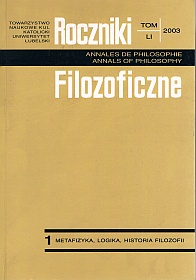Methodology of Bayesian Confirmation Theory
Abstract
Bayesian confirmation theory is conceived here as a model of inductive inference. A methodological facet of Goodman's grue paradox (MWP) constitutes a major difficulty for this theory. This could only be evaded on the grounds of philosophical assumptions such as the existence of laws of nature or natural kinds. These would unwittingly bias the theory towards some scientific hypotheses which would contradict the character of the theory. The analysis of J. Earman's and R. Chuaqui's formal frameworks demonstrates, however, that weaker assumptions, e.g. seemingly anti-realist admittance of the existence of symmetries alone, will not suffice to cope with (MWP). Finally then Bayesian confirmation theory faces a dilemma: either to allow for ad-hocness in narrowing down the class of its models or to defend a version of scientific realism, e.g. structural realism.
References
Carnap R., Logical foundations of probability, Chicago: Chicago University Press 1950.
Carnap R., On the application of inductive logic, „Philosophy and Phenomenological Research”, 8(1947), s. 133-147.
Chuaqui R., Truth, possibility and probability, Amsterdam: North-Holland 1991.
Cox R. T., The algebra of probable inference, Baltimore: Johns Hopkins Press 1961.
Dorling J., Bayesian conditionalization resolves positivist/realist disputes, „The Journal of Philosophy”, 89(1992), s. 362-382.
Earman J., Bayes or bust? A critical examination of Bayesian confirmation theory, Cambridge, Mass.: MIT Press 19922.
Fine T., Theories of probability: an examination of foundations, New York: Academic Press 1973.
Gillies D., Philosophical theories of probability, London: Routledge 2000.
Goodman N., On infirmities of confirmation-theory, „Philosophy and Phenomenological Research”, 8(1947/1948), s. 149-151.
Hendricks V. F., The convergence of scientific knowledge: a view from the limit, Dordrecht: Kluwer 2001.
Howson C., Hume's problem, Oxford: Oxford University Press 2000.
Howson C., Urbach P., Scientific reasoning: the Bayesian approach, Illinois: Open Court 19932.
Jeffrey R. C., Goodman's query, „The Journal of Philosophy”, 63(1966), s.281-288.
Jeffreys H., Theory of probability, Oxford: Clarendon Press 19663.
Kadane J. B., Schervish M. J., Seidenfeld T., Introduction, w: J. B. Kadane, M. J. Schervish, T. Seidenfeld (eds.), Rethinking the foundations of statistics, Cambridge: Cambridge University Press 1999, s.1-13.
Kadane J. B., Schervish M. J., Seidenfeld T., Shared preferences and state-dependent utilities, w: J. B. Kadane, M. J. Schervish, T. Seidenfeld (eds.), Rethinking the foundations of statistics, Cambridge: Cambridge University Press 1999, s. 169-193.
Kawalec P., 2001, Back to Green Perspectives on Confirmation as Justification, http://www.jtb-forum.pl/jtb/papers/pk_btgpocaj.pdf
Kawalec P., Structural reliabilism: inductive logic as a theory of justification, Dordrecht: Kluwer 2002.
Kornblith H., Inductive inference and its natural ground: an essay in naturalistic epistemology, Cambridge, Mass.: MIT Press 1993.
Morrison M., The new aspect: symmetries as meta-laws, w: R. Weinert (ed.) Laws of nature: essays on the philosophical, scientific and historical dimensions, Berlin: de Gruyter 1995, s. 157-188.
Mortimer H., Logika indukcji. Warszawa: PWN 1982.
Pietarinen J., Lawlikeness, analogy, and inductive logic, Amsterdam: North--Holland 1972.
Pollard D., A user's guide to measure theoretic probability, Cambridge: Cambridge University Press 2001.
Sober E., No model, no inference: a bayesian primer on the grue problem, w: D.Stalker, Grue! The new riddle of induction, Illinois: Open Court 1994, s. 225-240.
Solomon M., Social empiricism, London: MIT Press 2001.
Suppes P., Introduction to logic, Princeton: Nostrand 1957.
VanFraassen B., Laws and symmetry, Oxford: Clarendon Press 1989.
Wójcicki R., Topics in the formal methodology of empirical sciences, Dordrecht: Reidel 1979.
Zellner A., An introduction to Bayesian inference in econometrics, New York: Wiley 1971/1996.
Copyright (c) 2003 Roczniki Filozoficzne

This work is licensed under a Creative Commons Attribution-NonCommercial-NoDerivatives 4.0 International License.





